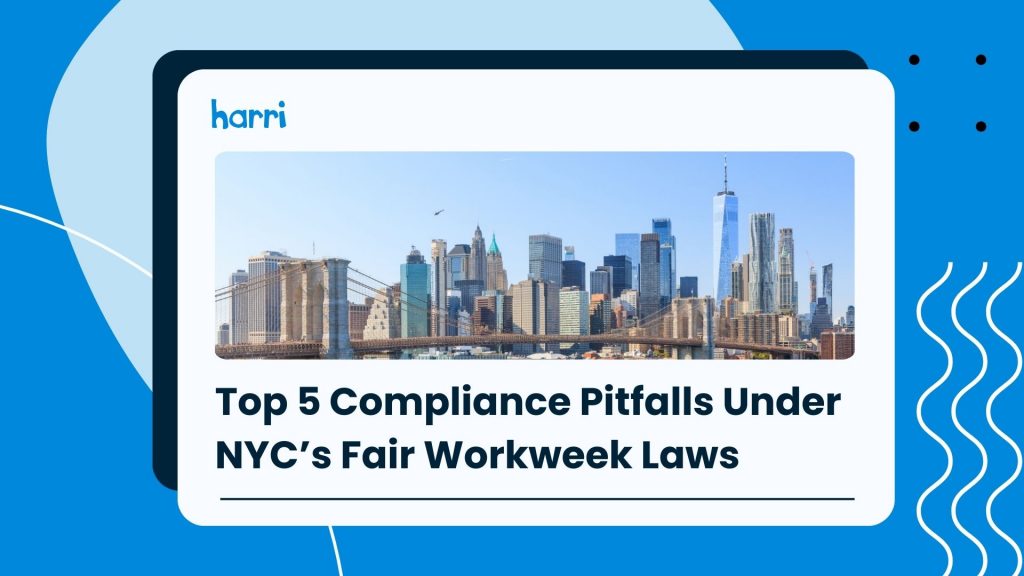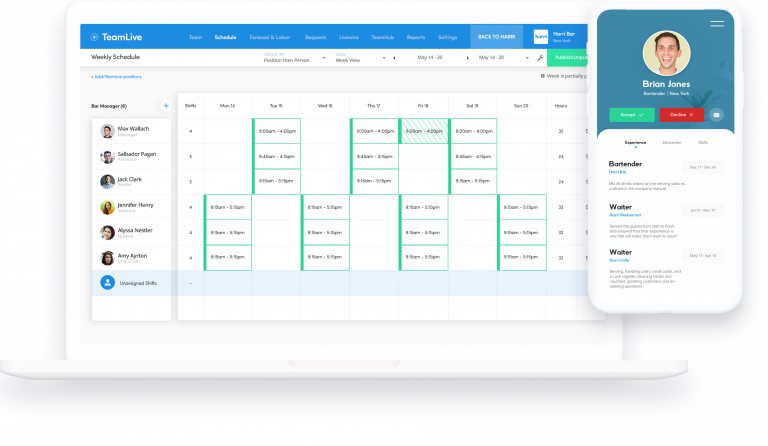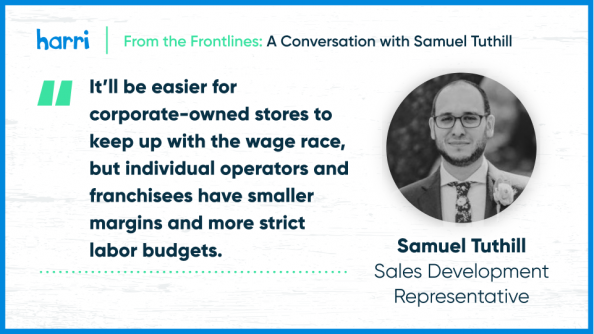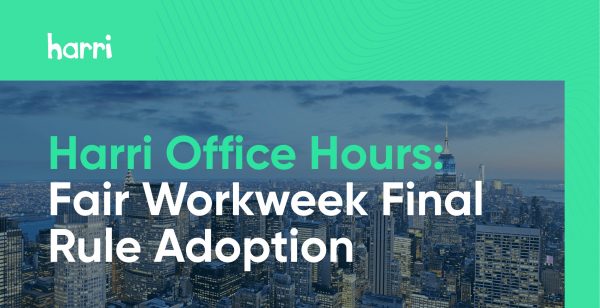Top 5 Compliance Pitfalls Under NYC’s Fair Workweek Laws (And How to Avoid Them)

- By Harri Insider Team | September 17, 2024
New York City’s Fair Workweek laws are strict, and non-compliance can lead to serious consequences. Hospitality businesses that fail to adhere to these regulations can face significant fines, legal penalties, and a loss of trust among employees. The complexity of these laws often leads to common mistakes in scheduling and labor management. By understanding where these pitfalls lie, operators can navigate these regulations effectively and protect their businesses from costly repercussions.
Pitfall #1: Non-Compliance with Regular Scheduling Requirements
What the Law Says
Fast food employers are required to provide their employees with a regular schedule, which must reflect a predictable, recurring set of shifts that employees can rely on week to week. This regular schedule should detail the expected days, times, and locations of the employee’s shifts and must be provided in writing when the employee starts. Employers must update the schedule in writing whenever they make long-term or indefinite changes.
The regular schedule must remain consistent unless the employee consents to a reduction in hours or the reduction is made for just cause or due to a bona fide economic reason. Any reductions in the regular schedule of more than 15% without these conditions violate the law.
Common Mistake
Employers often fail to provide or maintain a Regular Schedule for their employees. They may change employee schedules too frequently or without proper documentation, leaving employees with unpredictable hours. In some cases, employers reduce an employee’s hours by more than 15% without obtaining the necessary consent or justification required by law.
How to Stay Compliant
To stay compliant, fast food employers should maintain consistent and predictable Regular Schedules for their employees. When making changes to the regular schedule, employers should document them in writing and provide the updated schedule to the employee before posting the next one. Employers must also ensure that any reductions in hours receive the employee’s consent or are justified by just cause or a bona fide economic reason. Automated scheduling tools help employers track schedules and changes while ensuring proper documentation to avoid non-compliance.

Pitfall #2: Improper Scheduling Practices
What the Law Says
The Fair Workweek Law requires fast food employers to provide employees with work schedules at least 14 days in advance. If an employer makes last-minute changes (within the 14-day window), they must provide additional compensation in the form of schedule change premiums. Additionally, if shifts vary from the employee’s regular schedule by more than 15% or if unscheduled hours are added, the employer must first obtain the employee’s written consent before making those changes.
Common Mistake
Employers often make changes to schedules within the 14-day window without providing sufficient notice or paying the required schedule change premiums. Another common mistake is altering an employee’s schedule by more than 15% from their regular schedule or adding unscheduled shifts without obtaining the required written consent.
How to Stay Compliant
To avoid these pitfalls, employers should adhere to structured scheduling practices by providing schedules at least 14 days in advance. Employers must also pay schedule change premiums for any changes made within this period. Additionally, employers should obtain written consent from employees before adjusting schedules by more than 15% or adding new shifts. Using automated scheduling systems can help track changes and avoid costly mistakes.
Pitfall #3: Non-Compliance with Premium Pay
What the Law Says
The Fair Workweek Law for fast food employers focuses on providing employees with predictable schedules. If last-minute changes are made (with less than 14 days’ notice), employers may be required to pay schedule change premiums. The law also requires at least 11 hours between shifts when an employee works a closing shift followed by an opening shift (a “clopening”) unless the employee consents and is paid a $100 premium.
Common Mistake
Fast food employers often fail to meet the requirements for premium pay, including schedule change and clopening premiums. Fast food employers may mismanage scheduling by making last-minute changes without paying the required schedule change premiums. Another common mistake is scheduling clopenings without obtaining written consent from employees or failing to pay the necessary premiums for such shifts.
How to Stay Compliant
Fast food employers should ensure that schedules are posted at least 14 days in advance and that any last minute changes are accompanied by the required premium payments. Employers should also avoid scheduling clopenings unless employees consent in writing and are compensated with the $100 premium. Automated scheduling systems can help track these requirements and reduce the risk of non-compliance, promoting a stable and satisfied workforce.

Pitfall #4: Failing to Offer Extra Shifts to Existing Employees First
What the Law Says
The Fair Workweek Law mandates that before hiring new staff or using temporary workers, employers must first make reasonable efforts to restore hours to any employees discharged for economic reasons within the previous 12 months. If no eligible employees are available for reinstatement, employers must then offer available shifts to their current employees. This process ensures that employees have the opportunity to increase their hours and income before employers consider external hires. The law also requires employers to post notices of available shifts both electronically and in the workplace, giving employees a reasonable period to respond.
Common Mistake
Many employers fail to follow the proper steps when offering additional shifts. They may skip offering restored hours to previously discharged employees or neglect to notify current employees about available shifts properly. Whether this happens because of a rush to fill roles or a misunderstanding of the requirements, failing to follow the proper procedures can lead to violations.
How to Stay Compliant
To stay compliant, fast food employers must offer available shifts to existing employees before bringing in new staff or temporary workers. Employers should post notices of available shifts both electronically and in the workplace, providing employees with a reasonable time to respond. Document each step, from posting the shifts to tracking which employees accept or decline, to show compliance if audited. Prioritize offering shifts to employees at the location where the shifts will be worked, and make sure to restore hours to any employees discharged for economic reasons within the last 12 months.
Pitfall #5: Inadequate Record-Keeping
What the Law Says
The Fair Workweek Law requires hospitality employers to maintain detailed and accurate records to demonstrate compliance with scheduling and labor regulations. These records include, but are not limited to employee names, contact information, dates of employment, actual hours worked, work schedules, pay rates, schedule change premiums, clopening shifts, and and any agreements related to shift changes. Employers must keep these records for at least three years and be able to produce them upon request by the Department of Consumer and Worker Protection (DCWP).
Common Mistake
Many businesses fail to keep comprehensive and organized records, often misplacing critical documents such as work schedules, employee shift agreements, or records of schedule change premiums. In some cases, businesses may lack records of employee consent for additional shifts or schedule changes, or they may not have properly recorded schedule change premiums or clopening pay. These lapses make it difficult to prove compliance, especially during audits, inspections, or employee disputes. Additionally, poor record-keeping can cause authorities to assume employers are non-compliant, even if they have followed the law.
How to Stay Compliant
To ensure compliance, fast food and hospitality employers should adopt a robust digital record-keeping system that automatically captures, stores, and organizes all required records, such as work schedules, pay rates, schedule change premiums, and employee agreements. The system must retain records for the entire three-year period and be able to produce them upon request by the DCWP. Keep a detailed log of employee consent for schedule changes or clopenings, and track all payments related to schedule change premiums or clopening premiums. Well-maintained and accessible records help avoid penalties and provide essential evidence of compliance during disputes, audits, or legal challenges.
The Impact of Non-Compliance
Failure to comply with the Fair Workweek Law can lead to significant legal and financial repercussions. Businesses that do not adhere to these regulations risk facing fines, legal action, and penalties, which can quickly accumulate. In addition, employee dissatisfaction resulting from unpredictable schedules, lack of transparency, or unlawful reduction in hours can lead to increased turnover, lower morale, and reduced productivity. Poor record-keeping and improper scheduling practices further expose employers to potential litigation, audits, and reputational damage. Businesses must proactively approach compliance by following structured scheduling practices, obtaining employee consent when required, and maintaining detailed records.
How Harri Helps Hospitality Operators Stay Ahead of Common Pitfalls
Harri helps to equip hospitality operators with the tools to meet the stringent requirements of NYC’s Fair Workweek laws – and similar legislation in other jurisdictions. Harri’s workforce management platform streamlines scheduling, helps employers meet advance notice regulations, automates shift offers for existing employees, and helps reduce the risk of legal issues. With robust record-keeping capabilities, Harri captures details such as schedules and shift agreements, providing easy access for audits and legal inquiries. It also automates schedule change premiums, helping ensure employees are compensated fairly for any last-minute changes. By using Harri, operators can manage these complex regulations effectively and maintain a smooth, compliant operation.
How is your compliance health? Assess your NYC Fair Workweek health with this simple checkup.





















